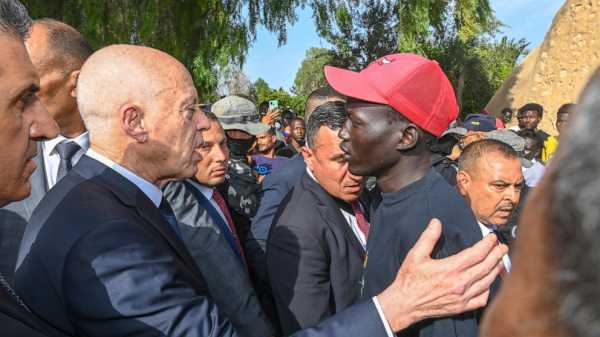
TUNIS, Tunisia — European leaders visiting Tunisia on Sunday held out the promise of more than 1 billion euros in financial aid to rescue its teetering economy and better police its borders, in an effort to restore stability to the North African country — and to stem migration from its shores to Europe.
A Tunisian rights group denounced the EU proposal as ‘’blackmail," saying it would worsen abuses of migrants and was aimed at closing Europe's doors to those in need.
Tunisia's increasingly autocratic president hosted the leaders of Italy, the Netherlands and the European Commission for talks aimed at smoothing the way for an international financial bailout of the troubled country.
On the eve of the talks, Tunisian President Kais Saied made an unannounced visit to a migrant camp in the coastal city of Sfax, a central jumping-off point for boat journeys crossing the Mediterranean to Italy. Saied spoke with families living in the camp, and pleaded for international aid for Africans who converge on Tunisia as a transit point to reach Europe.
His caring words — and sympathetic images of the president with migrant babies posted on his Facebook page — contrasted sharply with Saied's stance earlier this year. He stoked racist abuse of Black African migrants in Tunisia with a speech railing against a perceived plot to erase his country's Arab identity.
The president and Tunisian Prime Minister Najla Bouden met Sunday with Italian Premier Giorgia Meloni, Dutch Prime Minister Mark Rutte and European Commission President Ursula von der Leyen.
After the talks, von der Leyen announced a five-point program to support Tunisia, including up to 1.05 billion euros ($1.1 billion) in aid for Tunisia's indebted budget. The plan will be discussed with all 27 EU countries at their next summit in late June, she said.
In addition, the EU is discussing investment in high-speed broadband and other digital infrastructure for Tunisia, and 300 million euros in hydrogen and other renewable energy projects, von der Leyen said.
The plan also includes 100 million euros for Tunisian border operations, including search-and-rescue and anti-smuggling operations, she said. Amid criticism from migrant advocacy groups about forced repatriations and abuses of migrants in Tunisia, von der Leyen and Rutte insisted the program would respect human rights.
The aim is to “kill that cynical business model of the boat smuggler. Migration is at this moment one of the most important issues facing all of us,” Rutte said.
The Tunisian Forum for Economic and Social Rights (FTDES), which advocates for migrants, expressed concern about the European aid offer.
“Europe has not seen Tunisia as a country in need of cooperation based on genuine democracy guaranteeing rights and freedoms, but merely as an advanced border point requiring more equipment to contain immigration, with the aim that no one should be able to reach Europe,” it said in a statement Sunday.
“Their visits conceal blackmail and an attempt to haggle: money and aid in exchange for the role of border policeman.”
Stemming migration is especially important for the far-right Meloni, who was making her second trip in a week to Tunisia. Italy is the destination for most Europe-bound migrants leaving from the North African nation.
Meloni welcomed Sunday's announcements and said she hoped they paved the way for Tunisia to receive $1.9 billion in stalled International Monetary Fund support.
Saied has balked at conditions for the IMF money, which include cuts to subsidies on flour and fuel, cuts to the large public administration sector, and the privatization of loss-making public companies.
The president warns such moves would unleash social unrest, and bristles at what he calls Western diktats. But the economy is heading toward collapse and the population is already restive, disillusioned with both Saied’s leadership and the country’s decade-long experiment with democracy.
That has pushed more and more Tunisians to risk dangerous boat journeys across the Mediterranean to seek a better life. Tunisia is also a major migratory transit point for sub-Saharan Africans heading for Europe.
“Tunisia is a priority, because destabilization in Tunisia would have serious repercussions on the stability of all Northern Africa, and those repercussions inevitably arrive here," Meloni said Thursday.
Saied didn't immediately respond to the European offer.
Earlier this week, he said that addressing Tunisia's problems requires not only improved security but also “tools to eliminate misery, poverty and deprivation.″
While focusing on sub-Saharan migrants, he acknowledged that Tunisians too are seeking to emigrate, and are among thousands who drown in the Mediterranean every year. He blamed criminal networks, but also his government’s budget troubles.
Tunisia's budget deficit was aggravated by the COVID-19 pandemic and fallout from Russia’s war in Ukraine. The IMF aid was stalled amid political tensions and Saied's resistance to the required reforms. Saied disbanded parliament and had the constitution rewritten to give more power to the presidency, and has overseen a crackdown on opposition figures and independent media.
The Fitch ratings agency further downgraded Tunisia’s default rating Friday, meaning the country is inching closer to potentially defaulting on its debt.
The visit comes after the EU's member countries on Thursday sealed agreement on a plan to share responsibility for migrants entering Europe without authorization. The plan is still in the early stages.
___
Charlton reported from Paris. Frances D'Emilio in Rome, Colleen Barry in Milan, and Lorne Cook in Brussels contributed to this report.
___
Follow AP’s coverage of migration issues at https://apnews.com/hub/migration
Sourse: abcnews.go.com






